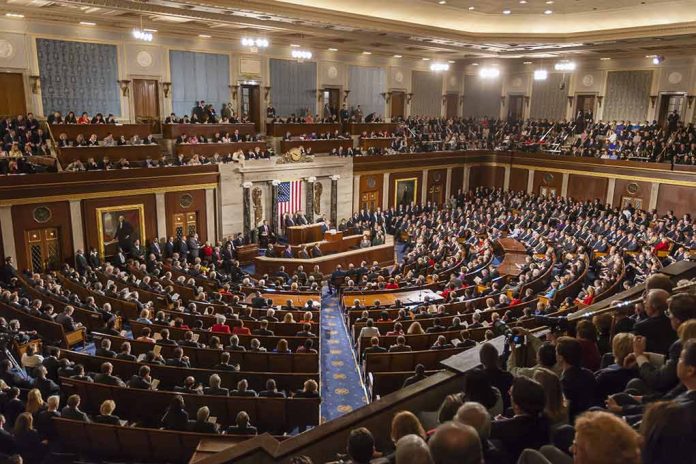
Senate Republicans resoundingly supported President Trump’s trade war policies, rejecting a resolution that would have terminated his national emergency declaration used to impose widespread tariffs.
Key Takeaways
- Senate Republicans voted 49-49 against Sen. Rand Paul’s resolution to end Trump’s “emergency” declaration for imposing tariffs.
- Vice President JD Vance cast the decisive vote to table the measure, preserving Trump’s tariff authority.
- Only Republican Senators Susan Collins and Lisa Murkowski joined Paul in supporting the resolution.
- The trade war is justified by the administration’s claim that imports pose an “unusual and extraordinary” threat to national security.
- The vote demonstrates strong Republican alignment with Trump’s assertive approach to international trade despite concerns about economic impacts.
Republicans Stand Firm on Trump’s Trade Policy
In a closely watched vote that tested Republican commitment to President Trump’s economic agenda, Senate Republicans demonstrated overwhelming support for his trade war policies. The Senate rejected a resolution introduced by Senator Rand Paul that would have terminated Trump’s national emergency declaration, which serves as the legal foundation for imposing 10 percent tariffs on most of America’s trading partners. The final tally stood at 49-49, with Vice President JD Vance stepping in to cast the deciding vote to preserve the President’s tariff authority.
The resolution required a simple majority to pass, but it faced significant hurdles even if successful. The White House had already signaled that President Trump would veto any attempt to curtail his trade powers, and procedural challenges in the House would have made it difficult to advance further. Senate Republican leadership demonstrated strong alignment with Trump’s assertive approach to trade negotiations, reinforcing the administration’s position that American economic interests must take priority in international commerce.
#BREAKING: Senate rejects measure to block Trump tariffs — 49-49 pic.twitter.com/Z2Snx5G0RV
— Backfire (@BackfireBros) April 30, 2025
Constitutional Concerns vs. Economic Strategy
Senator Rand Paul, who introduced the resolution, took a principled stance against what he views as executive overreach. In a passionate address to his colleagues, Paul emphasized the constitutional implications of the emergency declaration rather than focusing solely on the economic merits of the tariffs themselves. His argument centered on the separation of powers and Congress’s rightful authority over international trade policy.
Despite Paul’s constitutional objections, most Republican senators chose to support the President’s trade strategy. Only Senators Susan Collins and Lisa Murkowski, known for their occasional willingness to break with party ranks, joined Paul in voting for the resolution. Senate Majority Leader Mitch McConnell, who has historically opposed tariffs, was notably absent from the vote due to health issues, though his office indicated he “has been consistent in opposing tariffs and that a trade war is not in the best interest of American households and businesses.”
The Emergency Declaration Controversy
The cornerstone of President Trump’s trade war is his use of a national emergency declaration to impose tariffs. This declaration rests on the claim that imports from foreign countries constitute an “unusual and extraordinary” threat to the United States. Critics argue this stretches the definition of a national emergency beyond its intended purpose, while supporters maintain it’s necessary to address longstanding trade imbalances that have disadvantaged American workers and manufacturers.
Senator Paul noted that many of his Republican colleagues privately express reservations about the President’s trade policies but remain cautious about publicly opposing them. This dynamic highlights the strong influence Trump continues to wield within the Republican Party, particularly on economic issues that resonate with the party’s base voters. The vote serves as further evidence that most Republicans have embraced Trump’s vision of economic nationalism and his willingness to use tariffs as leverage in international negotiations.
Implications for American Businesses and Consumers
While Senate Republicans have solidified their support for the President’s trade agenda, the economic impact of these policies remains a matter of intense debate. The 10 percent tariffs affect products from nearly all of America’s trading partners, potentially raising prices for American consumers while also creating opportunities for domestic manufacturers. Supporters argue that these short-term adjustments are necessary to rebalance international trade relationships and revitalize American industry, particularly in manufacturing regions that have experienced economic decline in recent decades.
The Senate’s decision reflects a calculated political judgment that prioritizing American economic sovereignty and challenging what many Republicans view as unfair trade practices outweighs concerns about potential market disruptions. For manufacturers and businesses dependent on imported goods, however, the continuation of these tariffs means adjusting to a trade environment that increasingly emphasizes domestic production and imposes additional costs on international supply chains.
Sources:
Senate GOP leaders succeed in protecting Trump tariffs
Senate Republicans Voted Overwhelmingly To Continue Trump’s Trade War
Senate Rejects Bipartisan Measure to Undo Trump’s Tariffs



